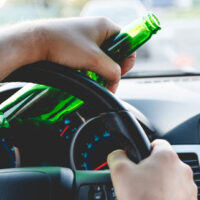Is Driving While Hungover the Same as Driving Drunk?

We thankfully live in a day and age when most people are well aware of the dangers of driving under the influence. So, when we do drink, we know to try to find a way home, other than driving ourselves.
But we rarely give any thought to the 8-12 hours, after we are drunk—commonly referred to as the hangover that we have, after waking up from a night of drinking. Having “slept it off,” most people will get behind the wheel of a vehicle at that point, and give little thought to how that hangover may be affecting the ability to operate a vehicle.
BAL Doesn’t Matter
After extended time, your blood alcohol level (BAL) may have lowered to legal limits. But remember that the state prosecutor does not need to show that you had any BAL at all, to convict you of DUI. It only needs to show that your normal faculties are impaired, because of drugs or alcohol, even if you don’t have any significant alcohol in your blood.
And when you have a hangover, your facilities certainly can be too impaired to operate a vehicle. In fact, we know that hangover symptoms may not even begin until your BAL level is near or even at, normal levels.
Why so Dangerous?
What makes being hungover so dangerous is that studies have shown that driving while being hungover may be just as bad as driving while actually drunk. Yet, we often don’t recognize if we’re hungover, or how impaired we actually are because of a hangover,
In some instances, we may just feel slow, cloudy, distracted, or just not like ourselves—things that many people experience at the start of a workday. Oversensitivity to light can also be a sign of being hung over, as can irritability. Headaches, nausea or being dizzy are some more oblivious signs of a hangover.
Ask the Right Questions
Often in injury cases, a personal injury attorney will ask if the driver was drinking within a short period of time prior to the accident. If the answer is no, that inquiry usually ends. But that may be a mistake. Defendants who cause accidents should always be asked when the last time that they drank actually was, and how much they had to drink.
If the Defendant had even a moderate amount of alcohol within a 10-15 hour period, a good personal injury attorney should start to explore whether or not the driver was suffering from or impaired by a hangover.
While many Defendants will vigorously deny that they were driving immediately after drinking, many will readily admit that they drove 8, 10, or 12 hours after consuming alcohol. At that point, experts can calculate the Defendant’s size and weight, and the amount of alcohol consumed, to determine whether the Defendant may have been intoxicated because of a hangover, at the time of the accident.
Injured by a drunk or hungover driver? Call the Tampa personal injury lawyers at Barbas, Nunez, Sanders, Butler & Hovsepian for help and to schedule a consultation today.
Sources:
wtaj.com/news/regional-news/aaa-warns-of-dangers-of-driving-hungover/
cbsnews.com/pittsburgh/news/aaa-new-years-hungover-driving/




